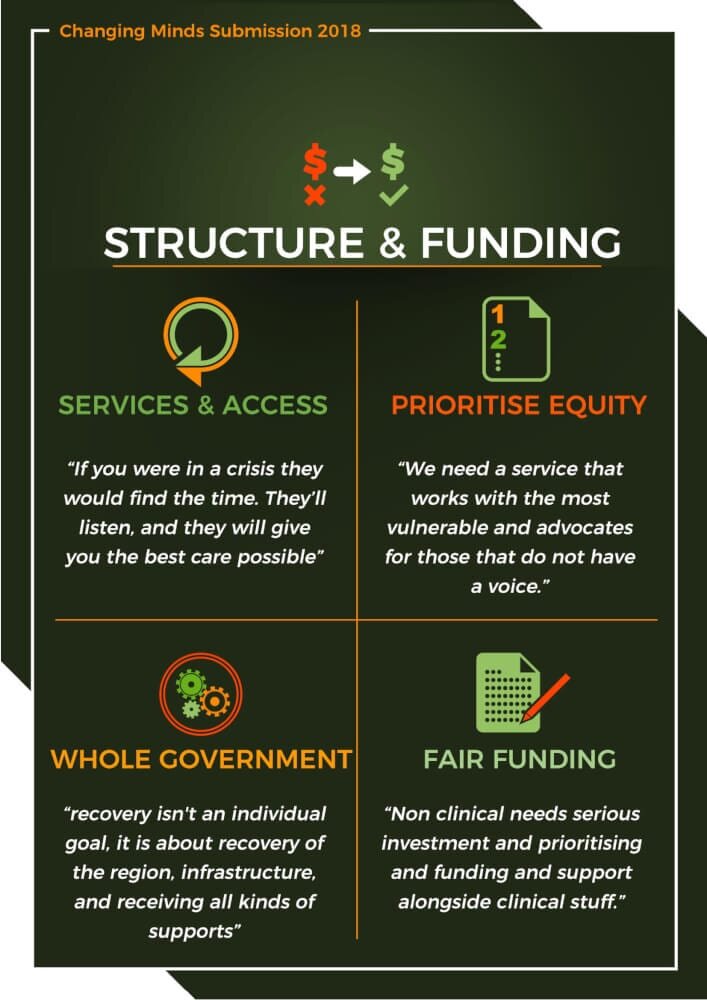Mental Health and Addiction Inquiry Submission
Changing Minds is a national lived-experience led not-for-profit focused on activities and projects that lead to better wellbeing for all. From the unique position of having “been there, lived that” we are a registered charitable trust who’s mission it is to support and champion the voices of people who access mental health and addiction services.
Changing Minds created a survey in March 2018 to give people an opportunity to contribute to the New Zealand Mental Health and Addiction Government Inquiry. This inquiry represents a rare opportunity to share experiences of having used mental health and addiction services and ideas for what our sector and services could and should look like in the future.
“My overall experience of services thus far has confused me; it seems when I am invested and trying to do the right I treated as if I’m not. I am treated better and given more options when in a state of tantrum and presenting badly. Has been a horrifying roller coaster of mixed messages, at a time of mental instability.”
We received 760 responses from people from a whole range of ages, ethnicities, diverse experiences using primary and secondary health services, and LGBTQI+/rainbow identities.
We would like to thank the 760 people with lived experience and their whānau who trusted us with their stories and believed that collectively we could amplify our voices and lead change in mental health and addictions in New Zealand. Your voices have shaped the following themes and our submission.
The thematic analysis of the responses from 760 members of the public who completed this survey asserts that it is important that people feel cared for, that they feel connected to one another, and that they are recognised and treated as individuals.
The following recommendations over the page take this complexity into account and are accordingly broad and principle-based:
A whole-of-government approach is required to significantly improve the wellbeing of New Zealanders. This includes public services and policies that are intentional and deliberate, and based on good evidence and partnership rather than political agendas, media, or pressure from vocal minorities.
Significant investment is required in both initiatives that directly support mental health, and other public services that determine wellbeing.
A diverse group of leaders with integrity – including mental health and addictions experts with lived experience, Māori, clinical mental health experts, and social sector experts – are required for this transformation.
These leaders must take a bold and critical approach; be constantly willing to learn, question, and challenge; and must draw on the considerable amount of information, expertise, and strategies that already exist.
The process must be reflective, evaluative, self-critical, and transparent from the beginning.
The focus must always be on valuing people and whānau, and creating a caring society.
“Empower the person rather than victimising them. Using the holistic approach attempts to engage whānau in a real way which does not relinquish their responsibility to their loved one. This will require a more in depth three party consultation i.e. whānau, services [and] tāngata whaiora to source the root of the issues to attempt to find healing in a real way…”
A Caring Society
Our Submission themes are the general themes that emerged from our community survey.
The four themes combined illustrate a picture of a caring society that truly values people and their whānau. This includes:
whole-of-government policy;
how mental health and addictions services are structured, funded, and staffed;
the options and choices available clinically and non-clinically;
how people are supported to connect with one another; and
how people’s contact with support services leave them feeling cared for, and like help is at hand.
Manaakitanga
Manaakitanga is ‘the process of showing respect, generosity and care for others’. In this analysis it refers to a caring attitude held by people and the systems they work in, and fosters a sense of being cared for, belonging, and hope.
There are four subthemes:
Feeling cared for by staff;
Feeling cared for by services;
Le va – Whānau; and
Le va – Peers and communities.
Honouring Diversity
The theme of Honouring Diversity is seeing and acknowledging people for who they are, meeting them where they are at, partnering with them in a meaningful way, and supporting them to engage with the options they choose.
In the words of a respondent:
“Weave the kete with many strands – applicable to each age or stage.”
There are four subthemes:
Clinical services;
Culturally responsive supports;
A life worth living; and
Meaningful choice.
Workforce
The Workforce appeared as a strong theme from all groups of respondents. One described its significance:
“People, not [inpatient] walls, save lives.”
This section is divided into four subthemes:
Workforce development (including the peer workforce),
Skilled,
Adequately staffed and resourced, and
Valuing staff.
Structure and Funding
Respondents consistently commented on ways to structure services and the wider sector, as well as funding priorities.
It is divided into four subthemes:
Services and access,
Whole of government approach,
Equity, and
Funding.





